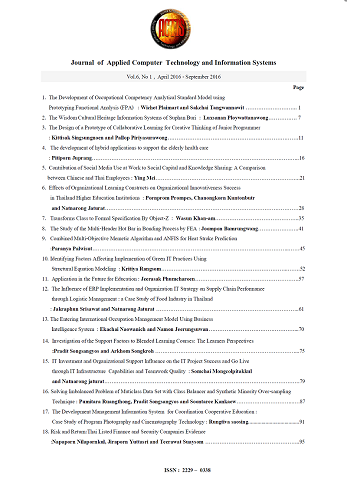EFFECTS OF ORGANIZATIONAL LEARNING CONSTRUCTS ON ORGANIZATIONAL INNOVATIVENESS SUCCES IN THAILAND HIGHER EDUCATION INSTITUTIONS
Main Article Content
Abstract
Research was conducted to test a model of organizational learning constructs effects on organizational innovativeness success within the context of the higher education institution of Thailand. Theories behind organizational learning were reviewed and evaluated to develop three appropriate constructs, which are knowledge acquisition and knowledge interpretation, organizational memory, and knowledge distribution. Study was completed by quantitative method that used of secondary data of 675 higher education faculties’ quality assurance result from database called CHEQA Online, published by the Office of the Higher Education Commission (OHEC). Data were investigated and analyzed by Structural Equation Model (SEM) analysis. Results indicated that there were positive effects of two constructs, organizational memory and knowledge distribution, of organizational learning on organizational innovativeness success were significantly at 0.01 and 0.05 levels, respectively. No effect of knowledge acquisition and knowledge distribution on organizational innovativeness success was found in the study.
การวิจัยครั้งนี้ มีวัตถุประสงค์เพื่อทดสอบโมเดลอิทธิพลของ การเรียนรู้ขององค์การในแต่ละองค์ประกอบที่มีต่อความสำเร็จของ องค์การด้านนวัตกรรม ในสถาบันการศึกษาระดับอุดมศึกษาในประเทศไทย จากการทบทวนวรรณกรรมเรื่องการเรียนรู้ขององค์การได้เสนอองค์ประกอบของการเรียนรู้ขององค์การเป็น 3 ส่วน คือ การรวบรวมความรู้และการแปลความหมายความรู้ ความทรงจำขององค์การ และการแบ่งปันความรู้ งานนี้เป็นการวิจัยเชิงปริมาณใช้ข้อมูลทุติยภูมิ คือข้อมูล ผลการประกันคุณภาพการศึกษาของคณะต่างๆ ในสถาบันระดับอุดมศึกษา จำนวน 675 คณะจากฐานข้อมูลของสำนักงาน คณะกรรมการการอุดมศึกษา (สกอ.) คือ CHEQA Online วิเคราะห์ข้อมูลด้วยวิธีการวิเคราะห์สมการโครงสร้าง (SEM) ผลการวิจัยพบว่า องค์ประกอบของการเรียนรู้ขององค์การสองส่วน ได้แก่ ความทรงจำขององค์การ และการแบ่งปันความรู้ขององค์การ มีผลกระทบทางบวกต่อความสำเร็จขององค์การด้านนวัตกรรม อย่างมีนัยสำคัญทาง สถิติ ที่ระดับ 0.01 และ 0.05 ตามลำดับ การศึกษาครั้งนี้พบว่า การรวบรวมความรู้และการแปลความหมายความรู้ไม่มีอิทธิพลต่อความสำเร็จขององค์การด้านนวัตกรรม
Article Details
It is the policy of ACTISNU to own the copyright to the published contributions on behalf of the interests of ACTISNU, its authors, and their employers, and to facilitate the appropriate reuse of this material by others. To comply with the Copyright Law, authors are required to sign an ACTISNU copyright transfer form before publication. This form, a copy of which appears in this journal (or website), returns to authors and their employers full rights to reuse their material for their own purposes.

